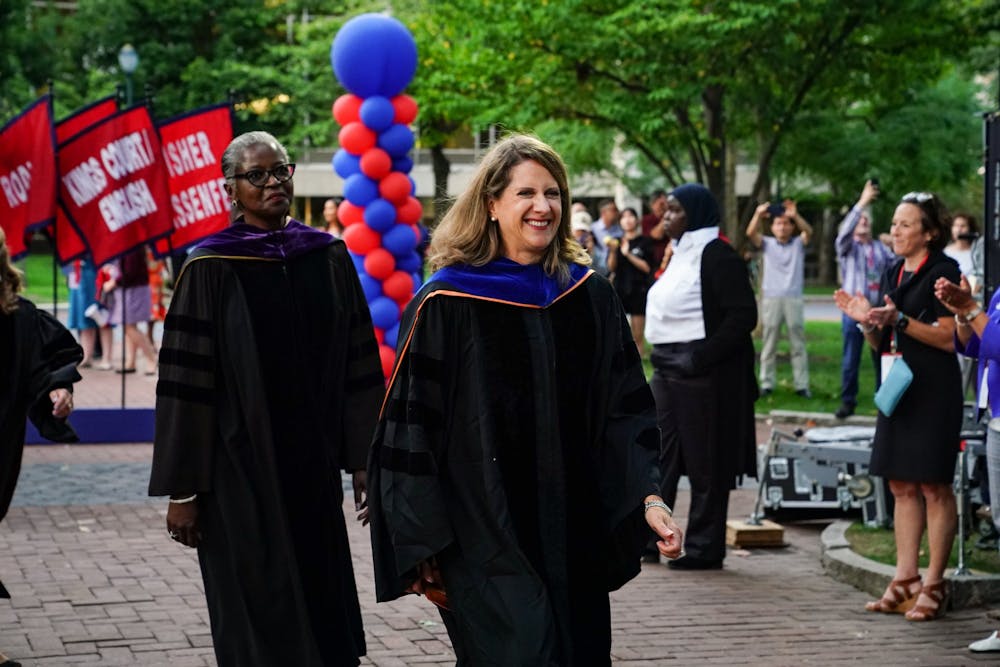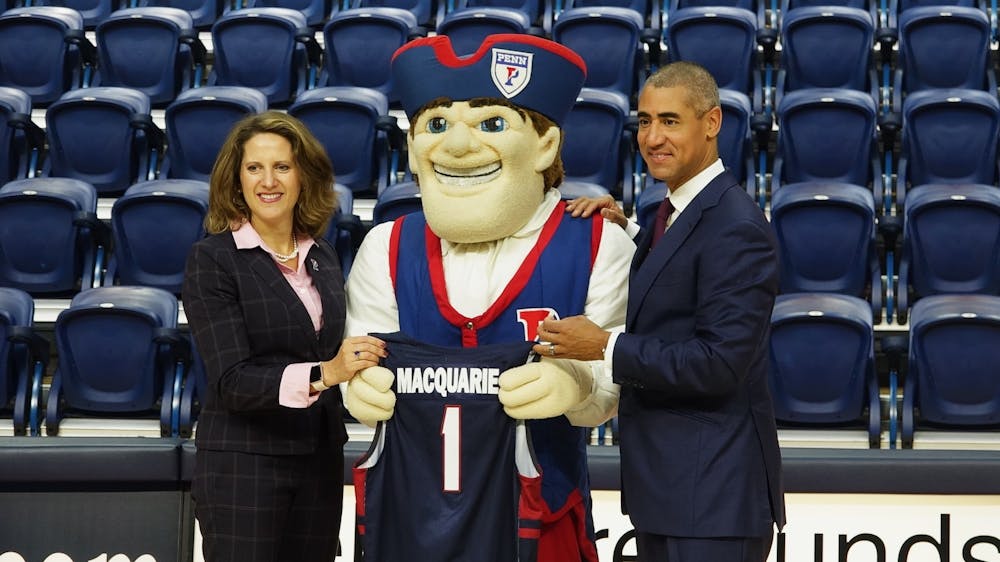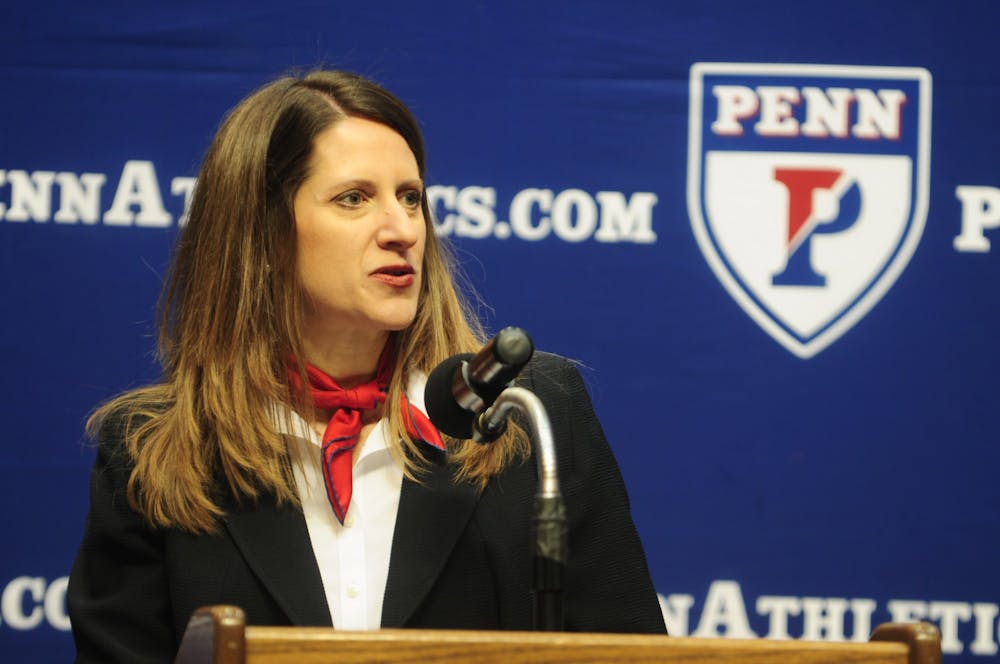
After seven years at Penn, M. Grace Calhoun is exiting as the Director of Athletics and Recreation to assume the same role at Brown. With her departure, she leaves behind a legacy that influenced all aspects of Penn Athletics.
Calhoun was hired in March of 2014 as Penn’s Athletics Director after the retirement of previous AD Steve Bilsky. By accepting the position, Calhoun became the first female athletics director in Philadelphia Big 5 history. Since then, she has managed to secure a great deal of funding for the athletics department, improve the stature and quality of Penn’s teams, and take on leadership roles in the NCAA and Ivy League, all while enduring a few controversies within the division.
On Calhoun’s departure, Penn President Amy Gutmann had nothing but praise to offer.
"Grace will depart having left an indelible mark on Penn Athletics not only on the field of competition but also in a deeply felt commitment to the overall health, safety and success of our student athletes and in the strategic planning and operations of the division,” she said.
During Calhoun’s tenure at Penn, the Quakers captured 27 Ivy League titles in 16 different sports, three individual national titles, and three national runner-up finishes, while also consistently garnering one of the highest NCAA Academic Progress Rates in the nation. The APR tracks the academic performance and subsequent eligibility of student-athletes.
Just four years into Calhoun's tenure, Penn’s average ranking in the Ivy League across all sports rose from 4.83 to 4.18.

Calhoun has also led an invigorated charge to elevate the athletics department’s endowment. She established the “Game Onward” fundraising campaign, which is on track to raise over $200 million for Penn Athletics by the end of the academic year. Additionally, Calhoun has aided in more than doubling the size of Penn’s athletics endowment and has increased annual fundraising to record highs, which includes a top-five national performance with $63.4 million raised in 2018-19.
In large part, this money has gone to the building or renovation of at least five athletics facilities as well as improvements in general program and department funding.
Outside of varsity athletics, Penn's Pottruck Health and Fitness Center, which is under Calhoun’s watch, is the nation’s second-rated fitness center. Pottruck, along with the Fox Fitness Center, has provided more than 5,000 recreation classes per year, with over 875,000 annual visits to these facilities by undergraduates, graduate students, and faculty and staff. Calhoun has also maintained oversight over club sports and intramural sports, which has given thousands of students athletic opportunities.
In trying to adapt her division into an inclusive and anti-racist one, Calhoun commissioned the Racial Justice Task Force, which was a move that Gutmann highlighted in her recent statement about Calhoun leaving.
“She has done important work in addressing issues of diversity, equity and inclusion within Athletics," Gutmann said.
In addition to her duties as Penn AD, Calhoun has held key positions in the conferences and leagues to which Penn belongs.
Since June of 2019, Calhoun has acted as chair of the NCAA Division I Council. In the role, she represents the council at the NCAA Division I Board of Directors and NCAA Association-wide Board of Governors and has been a key figure in the association’s efforts to adapt to the COVID-19 pandemic.
Calhoun also recently completed a two-year term as chair of the Ivy League Directors of Athletics and is the current chair of the Philadelphia Big 5 ADs.
For all her work and leadership, Calhoun was inducted into the 2020 class of “Game Changers: Women in Sports Business” by the Sports Business Journal and has also received a number of other awards and accolades.
Although the standing of Penn Athletics has undoubtedly improved over Calhoun’s tenure, there were a few controversies during her time as AD.
In 2017, Penn had to hire a new head coach for the men’s golf program. After going through different candidates, the search landed on Jason Calhoun, M. Grace’s husband. This hire launched numerous questions over nepotism and foul play, despite Calhoun having taken herself off the search process due to the issues that would inevitably arise.

Much of the criticism came from the notion that Calhoun had intentionally set the parameters so that her husband could get the position. Prior to the beginning of the search, Calhoun put a specific detail on the list of preferred qualifications: being a PGA Class A Professional. This specification left Michael Blodgett — who was the interim coach the season prior and was not a PGA Class A Professional — out of luck.
“Most college golf coaches do not have that classification. If you went through your top 100 schools in men’s and women’s golf, you might not even find ten that are considered Class A Professionals,” Golfweek Magazine writer and college golf expert Lance Ringler said of the situation in 2017.
Jason Calhoun remains the men’s golf head coach four years later.
Another set of issues that occurred during Calhoun’s tenure were separate mistreatment allegations on two Penn teams.
In 2018, Penn softball coach Leslie King was accused by former players of a years-long pattern of mistreatment that led many of them to quit the team. After the story broke, Calhoun sent out an email to Penn softball alumni looking for input. Ultimately, the decision was made to keep King.
A similar story came out in 2019 when new Penn volleyball head coach Iain Braddak was accused of mistreating his players. Eight grievances were filed amongst the 20 players on the team. The athletics department said that it thoroughly vetted each grievance that was filed, but players reported an inability to make their voices heard or to even get a meeting with Calhoun. In fact, several players said that the athletics department’s response, or lack thereof, left them feeling worse than the mistreatment itself. Braddak resigned from his position in January of 2020.
In spite of these three controversies, Calhoun had much success with the Quakers, which included raising hundreds of millions of dollars, improving the caliber of Penn’s varsity teams, and creating the framework and resources to make Penn Athletics an equitable division.
The Daily Pennsylvanian is an independent, student-run newspaper. Please consider making a donation to support the coverage that shapes the University. Your generosity ensures a future of strong journalism at Penn.
Donate






